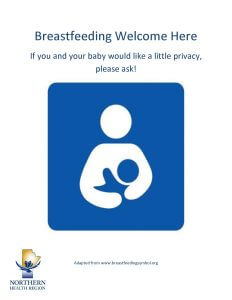Breastfeeding
Breastfeeding is a beautiful experience that will benefit you and your baby for a lifetime. From the moment your baby is born your adventure with your new baby begins. You will feel a deep love for your baby that breastfeeding will strengthen each and every day. What a remarkable feeling to be able to provide all of the nourishment your baby needs for the first 6 months of his or her life. Furthermore, breastfeeding does not end at 6 months. Your baby can benefit from your breastmilk until 2 years of age and beyond.
Deciding to Breastfeed
You may have questions about how to feed your baby – we want to support you to make an informed decision. It is important for you to have the most current up-to-date and research-based information. We want you to feel comfortable to discuss your thoughts, feelings and questions with health professionals such as physicians, obstetricians, nurse practitioners, midwives and public health nurses.
The Public Health Agency of Canada, the Dietitians of Canada, the Canadian Paediatric Society and the College of Family Physicians of Canada, as well as The World Health Organization and UNICEF agree that breastmilk is the natural food for newborns and contains everything that your baby needs for the first 6 months. At around 6 months, babies begin to eat solid foods and continue to breastfeed for up to 2 years and beyond.
These are excellent resources for you to view that discuss the importance of breastfeeding:
There are many booklets and printed resources available for you. The following is a list that you can access at your local health center:
- Breastfeeding…Your Baby’s First Food
- Baby’s Best Chance
- 10 Great Reasons to Breastfeed
- 10 Valuable Tips for Successful Breastfeeding
Getting Started with Breastfeeding
Holding your baby skin to skin, as well as putting your baby to your breast early and often, is important to help your baby learn how to breastfeed. At birth Mom produces colostrum, a thick and concentrated liquid that contains precious antibodies, learning how to hand express your colostrum can be helpful to help your baby latch at the breast. Allowing baby-led latching as well as watching for your baby’s feeding cues helps to establish a good milk supply. Your baby will need to feed often in the early weeks; 8 or more times in 24 hours. The following articles and videos will show you how to get started with breastfeeding:
- Breastfeeding Begins at Birth
- Baby’s First Breast Milk
- Baby Feeding Cues and Behaviours
- Learning to Latch
- Hand Expressing Breastmilk
Breastfeeding Positions
There are several ways to hold a baby to breastfeed – most are illustrated in the Baby’s Best Chance book as well as on the video link below. It is important to keep in mind that:
- The position must be comfortable for you throughout the feed
- Your baby needs to be close to your body, facing the breast
- Your baby’s nose should be opposite your nipple as you start to latch
- Your baby’s head, neck and body all need to be in a straight line
- Your baby’s head should be free to tilt backwards as he/she comes to the breast
Watch these videos to learn more about Breastfeeding Positions.
A Video on Breastfeeding Positions
How do I know if my baby is getting enough breast milk?
There are signs to watch for to see if your baby is getting enough milk. Your baby should be feeding at least 8 times in a 24 hour period. Your baby should have a strong lusty cry and wake on his/her own for feeds. Your baby should have enough wet or dirty diapers according to his age. Here are a couple of articles to help answer your questions:
Vitamin D and Your Breastfed Baby
Vitamin D is known as the sunshine vitamin and is important for bone growth. Because of Canada’s northern location and the fact that we protect babies from the sun and cold means that babies do not get enough of this vitamin. Health Canada recommends that all breastfed, healthy term babies receive 400 IU (International Units) daily. Older breastfed babies can also benefit from Vitamin D. It is available over the counter at pharmacy stores. Here are some articles:
Breastfeeding Support
Learning to breastfeed takes time and commitment and you may come across some challenges especially in the early weeks. With the right help and information, most challenges are temporary hitches. Here are a number of articles to assist and provide information for you:
- Baby Friendly Manitoba: Getting Help with Breastfeeding
- FAQs About Breastfeeding
- Managing Engorgement
- All About Supplementing
Health Links-Info Santé provides a 24 hour breastfeeding hotline that can be accessed toll free 1-888-315-9257. You can also call (204) 788-8667 which is not toll free but begins with recorded information about a number of breastfeeding concerns; this option may answer your question and save time waiting for a nurse to answer.
There is breastfeeding support in your local communities to help you with questions you may have. To find out the one closest to you, please contact your local Public Health Office or Nursing Station for information on local Breastfeeding groups or click HERE to be taken our Locations page.
Most of the Health Centres have Certified Lactation Consultants and trained Public Health Nurses to help you with breastfeeding. Breastfeeding group is also an excellent resource. Meeting other breastfeeding moms will help you succeed and become confident with breastfeeding.
Breastfeeding and Returning to Work or School
More and more women are successfully returning to work or school while continuing to breastfeed. By making a few adjustments to your schedule, you too can easily continue to offer your baby your milk.
Discuss your plan to continue breastfeeding after you return to work with your boss or supervisor. Talk about the importance of support for breastfeeding.
There are many benefits of continuing to breastfeed. Breastfed babies are healthier, and their mothers need less time off work or school to care for sick babies. Here is an additional resource for you to read:
The Baby Friendly Initiative (BFI)
The Northern Health Region has integrated the BFI Ten Steps to Becoming Baby Friendly into the health services that we provide for families and are striving to have all facilities and health centers accredited as being Baby Friendly. Currently in our Region, the following health centres are designated as Baby Friendly: The Pas Primary Health Care Centre, Flin Flon Primary Health Care Centre and Thompson Public Health.
The Baby Friendly Initiative is a part of the Manitoba Health Breastfeeding Strategy. As part of this initiative, we have a regional breastfeeding policy that we adhere to; a shortened version is posted in all public areas of our health facilities as well as a “Breastfeeding Welcome Here” sign.
Below are some documents with more information:
- Northern Health Region Breastfeeding Policy
- Baby Friendly Pledge
- Northern Health Region Breastfeeding Information Pamphlet
- Breastfeeding Committee of Canada
- BFI Strategy for Ontario: The Baby-Friendly Initiative: Strengthening Indigenous Families and Communities
Donating Breast Milk
If you are a mother with extra breast milk and thinking about donating to a milk bank you can contact The Women’s Health Clinic for more information.



